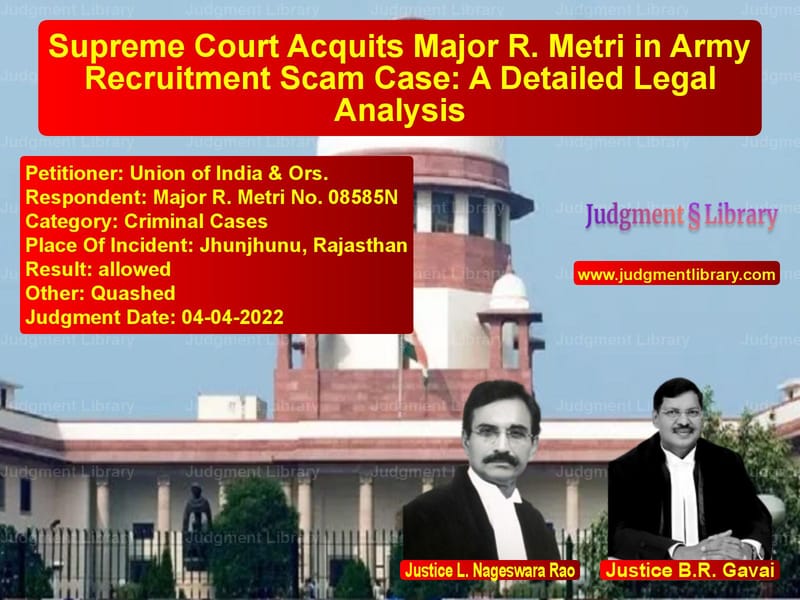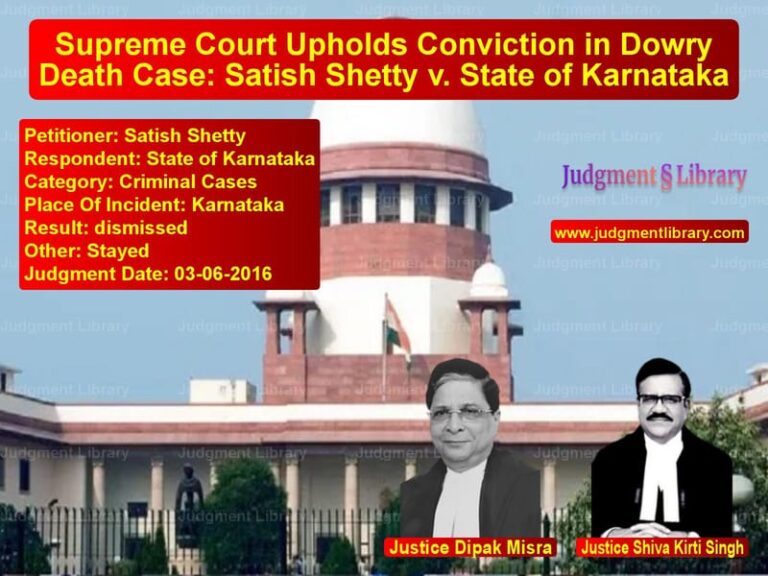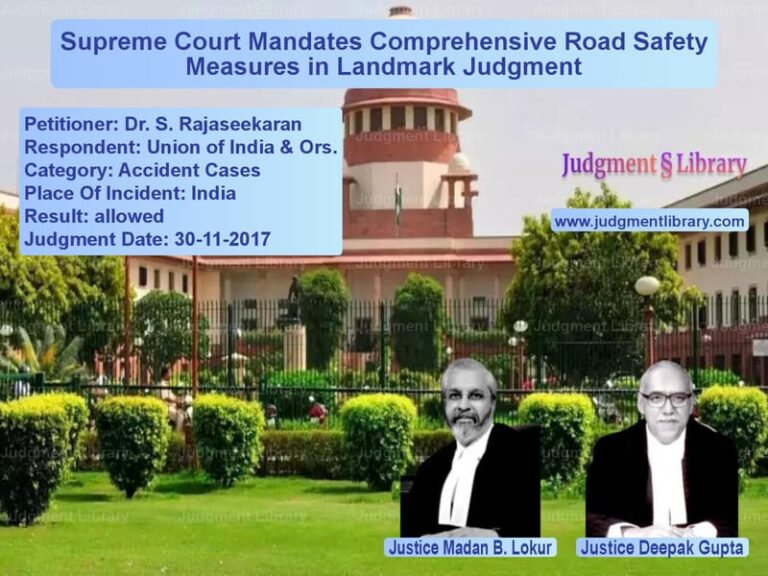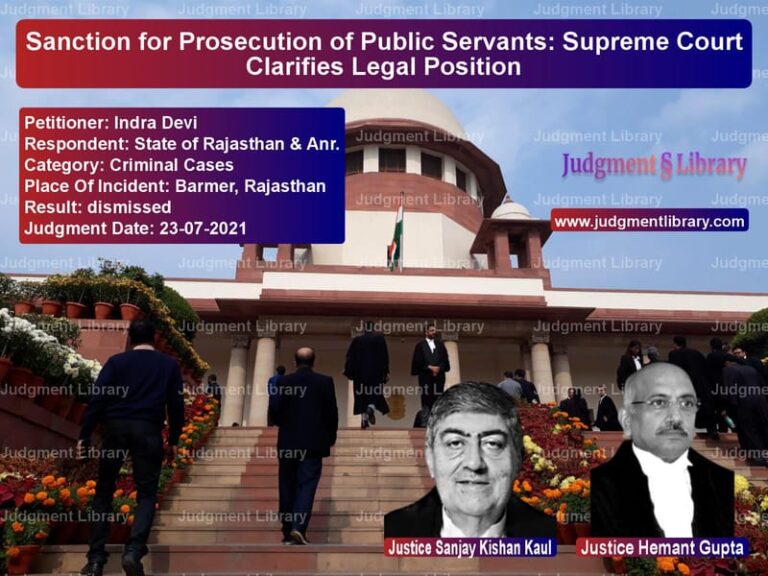Supreme Court Acquits Major R. Metri in Army Recruitment Scam Case: A Detailed Legal Analysis
The Supreme Court of India, in a significant ruling in the case of Union of India & Ors. vs. Major R. Metri No. 08585N, has overturned the conviction of an Army officer accused of corruption in a recruitment scam. This judgment sheds light on the evidentiary standards in military judicial proceedings and the requirement of due process in cases involving allegations of bribery and misconduct.
Background of the Case
Major R. Metri, serving as a Recruiting Medical Officer at the Army Recruiting Office in Jhunjhunu, Rajasthan, was accused of accepting bribes to clear medically unfit candidates during recruitment rallies in Udaipur and Dausa. The prosecution contended that he, along with other officers, conspired to influence the medical examination process in exchange for monetary benefits.
The case was initiated based on a confidential complaint, and a subsequent court of inquiry led to a General Court Martial (GCM). Major Metri was found guilty under the Prevention of Corruption Act and Section 63 of the Army Act, 1950, leading to his dismissal from service. However, the Armed Forces Tribunal (AFT) later acquitted him, holding that the evidence against him was inadequate.
The Union of India challenged the AFT ruling before the Supreme Court, arguing that the tribunal had overstepped its jurisdiction by interfering with the findings of the court-martial.
Charges and Convictions
| Charge | Provision | Initial Verdict |
|---|---|---|
| Corruption | Prevention of Corruption Act, 1988 | Convicted by GCM |
| Violation of Good Order and Discipline | Section 63 of the Army Act, 1950 | Convicted by GCM |
| Bribery | IPC Section 7 & 13 | Convicted by GCM |
Petitioner’s Arguments (Union of India)
- The AFT had exceeded its jurisdiction by re-evaluating evidence and substituting its findings for those of the court-martial.
- The confession made by Major Metri was admissible as evidence and was voluntarily given.
- The conviction should be upheld since corruption in Army recruitment poses a serious threat to national security and fairness in selection processes.
Respondent’s Arguments (Major R. Metri)
- The confessional statement was extracted under duress and should not have been used as the sole basis for conviction.
- There was no direct evidence linking him to bribery transactions; financial records showed no unusual deposits.
- The medical examination process involved multiple officers, and a single officer could not have influenced the final decision.
- He had received threats from touts and recruitment agents, indicating that he was being falsely implicated.
Supreme Court’s Observations
1. Evidentiary Standards in Military Justice
The Supreme Court emphasized that the military justice system must adhere to constitutional principles of fairness. It stated:
“The evidentiary burden in military court proceedings must meet the threshold required under criminal law, particularly in corruption cases where direct evidence is essential.”
2. Reliability of Confessional Statements
The Court noted that a confession obtained under pressure cannot be the sole basis of conviction. It cited the case of State of Tamil Nadu v. N. Suresh Rajan, where it was held that:
“A confessional statement must be corroborated by independent evidence to sustain a conviction.”
3. Procedural Irregularities
The Court found that the General Court Martial had failed to follow due process in assessing evidence. It observed:
“The failure to provide the accused with an opportunity to challenge witness testimony before relying on their statements amounts to a violation of natural justice.”
4. Lack of Direct Financial Evidence
The Supreme Court ruled that the prosecution failed to establish that the money allegedly received by Major Metri was linked to bribes:
“In the absence of direct evidence linking financial transactions to illicit gains, mere suspicion cannot justify a conviction.”
5. Armed Forces Tribunal’s Authority
The Court dismissed the contention that the AFT lacked jurisdiction to overturn the court-martial ruling. It noted:
“The Armed Forces Tribunal is empowered to review disciplinary proceedings to ensure compliance with principles of justice.”
Final Judgment
- The Supreme Court dismissed the appeal filed by the Union of India.
- Major R. Metri’s conviction under the Prevention of Corruption Act was quashed.
- His dismissal from service was set aside.
- The Court ordered his reinstatement with no back wages but full pensionary benefits.
Impact of the Judgment
- Reinforces the importance of procedural fairness in military trials.
- Emphasizes that extra-judicial confessions cannot be the sole basis of conviction.
- Sets a precedent for evidentiary standards in corruption cases involving defense personnel.
- Ensures that officers accused of corruption are given adequate opportunities to defend themselves.
Conclusion
The Supreme Court’s ruling in Union of India vs. Major R. Metri is a landmark judgment that upholds the principles of justice in military trials. By quashing the conviction based on procedural lapses and insufficient evidence, the Court has reaffirmed that even in cases involving the armed forces, due process and fair trial principles must be maintained. The ruling underscores the necessity for concrete evidence in corruption cases and ensures that no officer is unfairly targeted without a proper legal basis.
Petitioner Name: Union of India & Ors..Respondent Name: Major R. Metri No. 08585N.Judgment By: Justice L. Nageswara Rao, Justice B.R. Gavai.Place Of Incident: Jhunjhunu, Rajasthan.Judgment Date: 04-04-2022.
Don’t miss out on the full details! Download the complete judgment in PDF format below and gain valuable insights instantly!
Download Judgment: union-of-india-&-ors-vs-major-r.-metri-no.-0-supreme-court-of-india-judgment-dated-04-04-2022.pdf
Directly Download Judgment: Directly download this Judgment
See all petitions in Fraud and Forgery
See all petitions in Bail and Anticipatory Bail
See all petitions in Judgment by L. Nageswara Rao
See all petitions in Judgment by B R Gavai
See all petitions in allowed
See all petitions in Quashed
See all petitions in supreme court of India judgments April 2022
See all petitions in 2022 judgments
See all posts in Criminal Cases Category
See all allowed petitions in Criminal Cases Category
See all Dismissed petitions in Criminal Cases Category
See all partially allowed petitions in Criminal Cases Category







